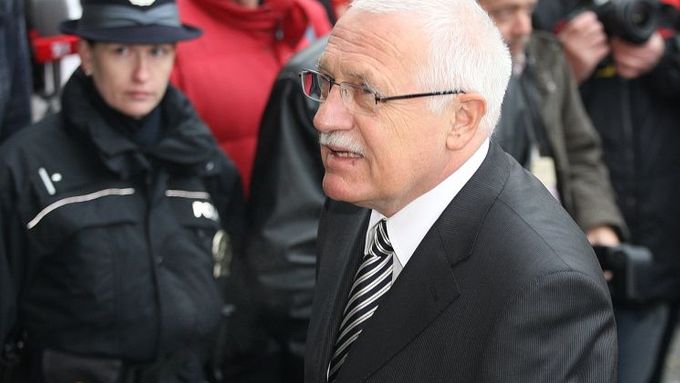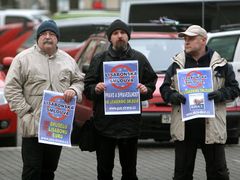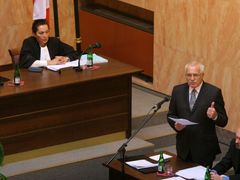Brno - The Whole of Europe is closely watching the Czech Republic today.
The last country which has not yet officially expressed its opinion about the pivotal EU reform document dubbed commonly the Lisbon Treaty could take a clearer stand after the Constitutional Court public hearing on the pact.
In essence, the Lisbon Treaty replaces the EU Constitution Treaty of 2005 that failed to win approval in national referendums in the Netherlands and in France.
To speed up the ratificaiton process, majority of the EU leaders decided to submit it to a parliamentary vote rather than to a national referendum.
The purpose of the Treaty is to guarantee a more effective functioning of the EU but some regard it as interfering with internal matters of a given state. Among the most vocal critics is also Czech President Václav Klaus.
At a press conference two weeks ago in Ireland during his state visit, Václav Klaus said he feared freedom and democracy would "not be enhanced" by the treaty, as reported by BBC.
Václav Klaus went so far and met Declan Ganley, the head of Libertas, a powerful conservative think-tank that had campaigned against the pact. Many believe that they were behind the Irish rejection of the treaty in June this year.
Tuesday morning saw the Lisbon Treaty debated at the Constitutional Court's session.
The ConCourt is to decide whether the EU document is in line with the Czech constitution or not. If the Treaty is approved by the Constitutional Court, it will be passed over to Czech law-makers who will vote on the ratification of the Treaty.
The Czech Republic is not the only country that sent the Treaty to the Constitutional Court. Germany has done the same thing.
Aktuálně.cz CzechNews has prepared the most interesting points from its online reporting on the Lisbon Treaty debate in Brno's Constitutional Court.
**
11,48 - The Court adjounred the public hearing until Wednesday, November 26.
11,43 - The judges posed no question, which angered Václav Klaus. "This is depressing," said Klaus.
11,34 Deputy PM for EU AffairsAlexandr Vondra stated the opposite of what Václav Klaus was saying. The Treaty would not make the EU "a federal state" and the Treaty does not breach the Czech constitution. "The Czech Republic will stay a sovreign, democratic and legal state. The Lisbon Treaty does not alter these principles, just the opposite - it strengthens them," said Vondra.
11,23 - "I am glad that this hearing is public, so that the Czech public may hear arguments first-hand and not in an interpreted and often way distorted way," said President Klaus at the end of his speech.
11,04 - President Václav Klaus is having his speech. In his view the Treaty is not in line with the Czech constitution. "It [the Treaty] will change our international position as well as the internal relations within our country. Democratically constituted bodies will not be able to make decisions in some matters regarding public life. It will be different bodies that will decide upon these issues and these are not subject to democratic control," says President Klaus. "Our decision upon the Treaty cannot be done under any foreign pressure or short-sighted interests of some politicians. The decision to be taken today will concern a number of generations, not only a few years," pointed out President Klaus.
10,56 - After a short break, Court Chairman Pavel Rychetský makes everybody present in the room laugh, as instead of Václav Klaus he says Václav Havel.
10,46 - German TV station ZDF is present at the hearing.
10,00 - Judge Güttler finishes his reading. The last statement is that of the Czech government. "The government does not share concerns of the Senators that the Treaty would restrict the country's sovereignty through political pressure, which would eventually lead to changes in the internal legal system of the Czech Republic."
9,36 - Judge Vojen Güttler is reading President Klaus' statement, in which among other things Klaus argues that the goal of the Treaty is to build "a European nation", which is wrong. In his view the constitutional court should clearly state whether the Czech Republic is to preserve its sovereignty in case the Treaty will be approved. One of Klaus' most frequent arguments is that the Treaty would bring a "fatal restriction of national sovereignty".
8,45 - Most of the public present at the hearing are lawyers. Czech voters showed less interest in the Lisbon Treaty hearing than in that that concerned PM Topolánek government's reforms not long ago.
8,35 - A handful of members of Národní strana (National Party), Právo a spravedlnost (Right and Justice) Party are demonstrating in front of the Constitutional Court against the Lisbon Treaty.
8,30 Among the first speakers is member of EU Parliament Vladimír Železný who argued that passing the Treaty would allow Sudeten Germans claim their property back.


